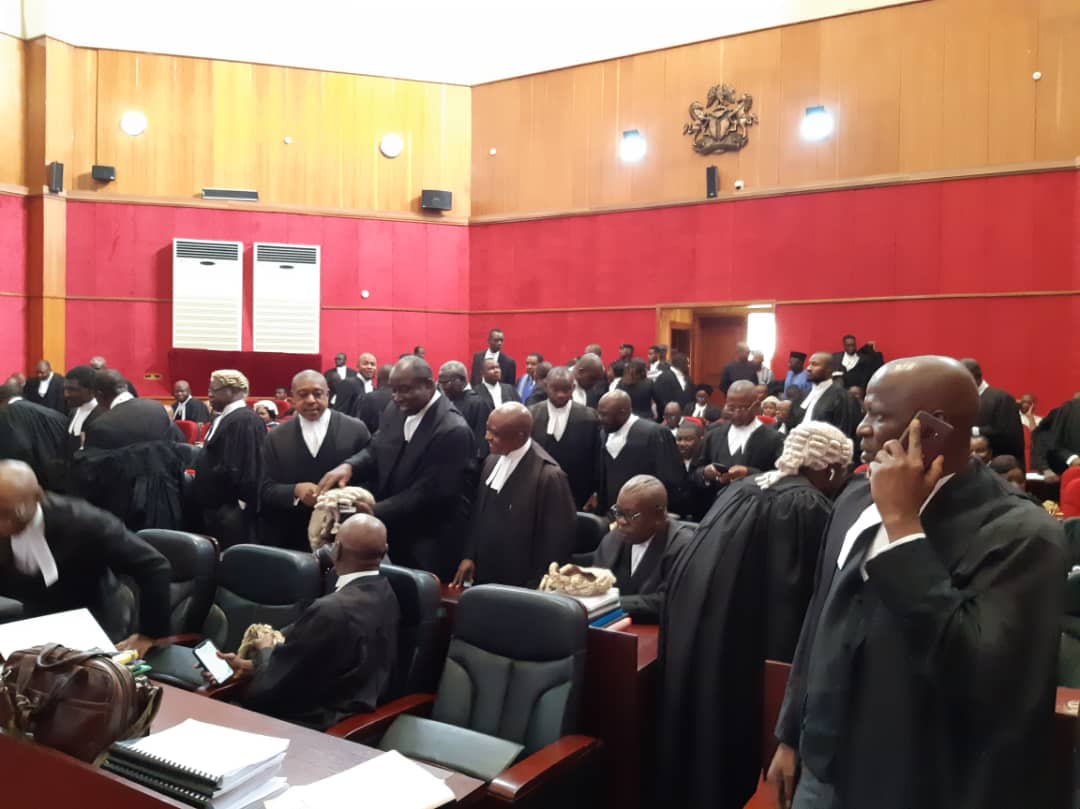PEPC: The Way of the Law
Last week, a five-member panel of the presidential election tribunal sat for over ten hours to announce their positions on the petitions against the 2023 presidential elections, and it was more than a televised sleeping marathon. The day was preceded by threats, both subtle and overt, from certain partisans who assumed that the law is […]

FILE PHOTO: Presidential Election Petition Court
Last week, a five-member panel of the presidential election tribunal sat for over ten hours to announce their positions on the petitions against the 2023 presidential elections, and it was more than a televised sleeping marathon. The day was preceded by threats, both subtle and overt, from certain partisans who assumed that the law is based on sentiments and emotions. However, the panel was not unaware of such threats and even took turns to hint at the audacity of those who assumed they could bully them into delivering favourable judgments.
Ahead of the judgment day, the Chairman of the Presidential Election Petitions Court (PEPC), Justice Haruna Tsammani, had his life and family threatened by a vile partisan group, with some of their members even publishing his photograph, along with his family’s, to warn him about the consequences of the tribunal’s outcome—a judgment that didn’t align with their partisan sentiments.
After those long hours, the court, having reaffirmed its independence and acknowledged threats to their lives, ruled that the Peoples Democratic Party (PDP) candidate, Atiku Abubakar, and his Labour Party (LP) counterpart, Peter Obi, failed to prove the allegations of fraud, President Bola Tinubu’s ineligibility, and others in their petitions challenging the outcome of the tightly contested election.
The most scathing criticisms of the petitions during the ruling probably came from Justice Monsurat Bolaji-Yusuf, a vocal member of the five-person panel, who not only dared the blackmailers who assumed their social media bullying would influence their decisions but also berated the petitioners for their inability to prove their cases.
- Man remanded for threatening to kidnap nephew over debt
- Gombe Athletics Association donates to academy students
“The petitioners either did not understand the explanation of the first respondent or were simply fixated on their belief that they won the election without any compelling and credible evidence,” she said, adding, “They did not even bother to present such credible evidence before this court.” Her most famous words were directed at the petitioners: “Were they expecting the court to gather evidence from the street or the market? Or to be swayed or intimidated by threats on social media. That is not the way of the court.”
As expected, with the presidential election unanimously upheld by the panel, those criticised in Justice Bolaji-Yusuf’s ruling took to social media to question the court’s credibility and even cast doubts on the Nigerian judiciary, further confirming what she had said about them on television: “It’s clear that the petitions from the outset were engaged in a wild goose chase and an inquisitorial adventure.”
The responses to the partisan conspiracy to discredit the court’s judgment have a series of reality checks, as exemplified by Justice Bolaji-Yusuf’s ruling. This was also echoed by the intervention of the FCT Minister, Mr. Nyesom Wike, on Channels Television’s Politics Today programme, a day after the judgment. Responding to those who claimed the judiciary was compromised, he shared a page from the Labour Party’s candidate, Peter Obi’s political struggles and asked, “Did Peter Obi not win at the Supreme Court when he was removed as governor? Did he pay a bribe? Let him tell the world now.” He went on to say that “When he was removed as governor, did he not reclaim his mandate at the Supreme Court? The judiciary was right then, but now that the decision didn’t favour them, the judiciary is wrong.”
One thing the individuals dispensing threats on social media have failed to come to terms with in their efforts to bully the nation into succumbing to their emotions and sentiments is that the courtroom is not the place for emotional calisthenics and sentiments; it’s a place for evidence. The only logical step to take now that their social media conspiracy theories about the election have been disproven is either to accept Justice Bolaji-Yusuf’s challenge to produce concrete evidence to pursue the case further or return to their previous positions of demanding good governance, whether well-intentioned or to dramatise their dissatisfaction with those in power.
Whichever the case, it’s their fundamental human right to seek the governance they desire or deserve. But, regardless of their anger, no group’s interest supersedes that of others, and whatever their grievances against the Independent National Electoral Commission (INEC), it remains the only constitutionally-sanctioned body allowed to regulate the processes of choosing the nation’s political leaders. It’s amusing that even in the partisans’ emotional campaign to label INEC as perpetually untrustworthy, which the court had disproved, they still clung to the state and legislative elections won by candidates of their political parties.
The alternative to respecting the institutions in place to conduct elections and administer justice when malpractices are alleged is a path for which even the critics of INEC and doubters of the judiciary are unprepared. When an individual or a small group believes their preferences override those of a larger group or the majority in an election, it’s no longer democracy. Fortunately, the law is there to keep us in check, guiding us through emotions and sentiments.
